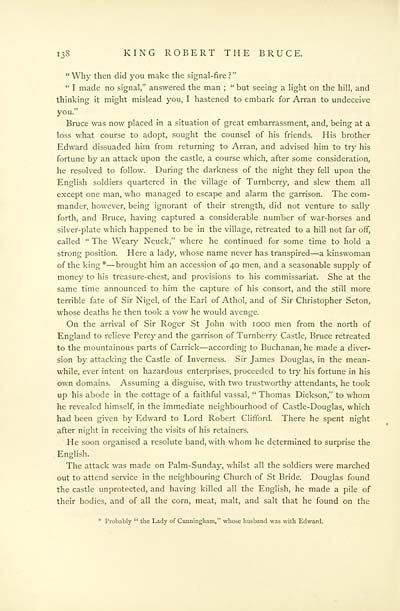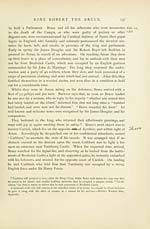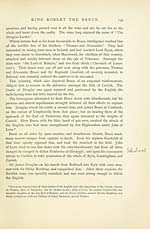Family records of the Bruces and the Cumyns
(150) Page 138
Download files
Complete book:
Individual page:
Thumbnail gallery: Grid view | List view

138 KING ROBERT THE BRUCE.
"Why then did you make the signal-fire ?"
" I made no signal," answered the man ; " but seeing a light on the hill, and
thinking it might mislead you, I hastened to embark for Arran to undeceive
you."
Bruce was now placed in a situation of great embarrassment, and, being at a
loss what course to adopt, sought the counsel of his friends. His brother
Edward dissuaded him from returning to Arran, and advised him to try his
fortune by an attack upon the castle, a course which, after some consideration,
he resolved to follow. During the darkness of the night they fell upon the
English soldiers quartered in the village of Turnberry, and slew them all
except one man, who managed to escape and alarm the garrison. The com-
mander, however, being ignorant of their strength, did not venture to sally
forth, and Bruce, having captured a considerable number of war-horses and
silver-plate which happened to be in the village, retreated to a hill not far off,
called " The Weary Neuck," where he continued for some time to hold a
strong position. Here a lady, whose name never has transpired — a kinswoman
of the king* — brought him an accession of 40 men, and a seasonable supply of
money to his treasure-chest, and provisions to his commissariat. She at the
same time announced to him the capture of his consort, and the still more
terrible fate of Sir Nigel, of the Earl of Athol, and of Sir Christopher Seton,
whose deaths he then took a vow he would avenge.
On the arrival of Sir Roger St John with 1000 men from the north of
England to relieve Percy and the garrison of Turnberry Castle, Bruce retreated
to the mountainous parts of Carrick — according to Buchanan, he made a diver-
sion by attacking the Castle of Inverness. Sir James Douglas, in the mean-
while, ever intent on hazardous enterprises, proceeded to try his fortune in his
own domains. Assuming a disguise, with two trustworthy attendants, he took
up his abode in the cottage of a faithful vassal, " Thomas Dickson," to whom
he revealed himself, in the immediate neighbourhood of Castle-Douglas, which
had been given by Edward to Lord Robert Clifford. There he spent night
after night in receiving the visits of his retainers.
He soon organised a resolute band, with whom he determined to surprise the
English.
The attack was made on Palm-Sunday, whilst all the soldiers were marched
out to attend service in the neighbouring Church of St Bride. Douglas found
the castle unprotected, and having killed all the English, he made a pile of
their bodies, and of all the corn, meat, malt, and salt that he found on the
* Probably " the Lady of Cunningham," whose husband was with Edward.
"Why then did you make the signal-fire ?"
" I made no signal," answered the man ; " but seeing a light on the hill, and
thinking it might mislead you, I hastened to embark for Arran to undeceive
you."
Bruce was now placed in a situation of great embarrassment, and, being at a
loss what course to adopt, sought the counsel of his friends. His brother
Edward dissuaded him from returning to Arran, and advised him to try his
fortune by an attack upon the castle, a course which, after some consideration,
he resolved to follow. During the darkness of the night they fell upon the
English soldiers quartered in the village of Turnberry, and slew them all
except one man, who managed to escape and alarm the garrison. The com-
mander, however, being ignorant of their strength, did not venture to sally
forth, and Bruce, having captured a considerable number of war-horses and
silver-plate which happened to be in the village, retreated to a hill not far off,
called " The Weary Neuck," where he continued for some time to hold a
strong position. Here a lady, whose name never has transpired — a kinswoman
of the king* — brought him an accession of 40 men, and a seasonable supply of
money to his treasure-chest, and provisions to his commissariat. She at the
same time announced to him the capture of his consort, and the still more
terrible fate of Sir Nigel, of the Earl of Athol, and of Sir Christopher Seton,
whose deaths he then took a vow he would avenge.
On the arrival of Sir Roger St John with 1000 men from the north of
England to relieve Percy and the garrison of Turnberry Castle, Bruce retreated
to the mountainous parts of Carrick — according to Buchanan, he made a diver-
sion by attacking the Castle of Inverness. Sir James Douglas, in the mean-
while, ever intent on hazardous enterprises, proceeded to try his fortune in his
own domains. Assuming a disguise, with two trustworthy attendants, he took
up his abode in the cottage of a faithful vassal, " Thomas Dickson," to whom
he revealed himself, in the immediate neighbourhood of Castle-Douglas, which
had been given by Edward to Lord Robert Clifford. There he spent night
after night in receiving the visits of his retainers.
He soon organised a resolute band, with whom he determined to surprise the
English.
The attack was made on Palm-Sunday, whilst all the soldiers were marched
out to attend service in the neighbouring Church of St Bride. Douglas found
the castle unprotected, and having killed all the English, he made a pile of
their bodies, and of all the corn, meat, malt, and salt that he found on the
* Probably " the Lady of Cunningham," whose husband was with Edward.
Set display mode to:
![]() Universal Viewer |
Universal Viewer | ![]() Mirador |
Large image | Transcription
Mirador |
Large image | Transcription
Images and transcriptions on this page, including medium image downloads, may be used under the Creative Commons Attribution 4.0 International Licence unless otherwise stated. ![]()
| Histories of Scottish families > Family records of the Bruces and the Cumyns > (150) Page 138 |
|---|
| Permanent URL | https://digital.nls.uk/95072786 |
|---|
| Description | A selection of almost 400 printed items relating to the history of Scottish families, mostly dating from the 19th and early 20th centuries. Includes memoirs, genealogies and clan histories, with a few produced by emigrant families. The earliest family history goes back to AD 916. |
|---|

